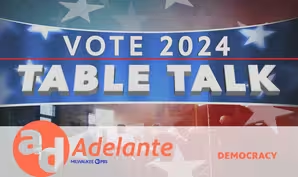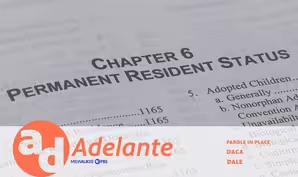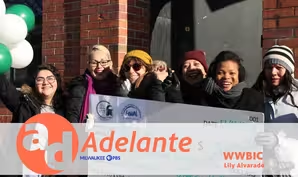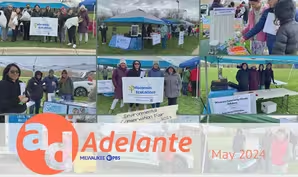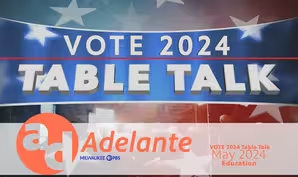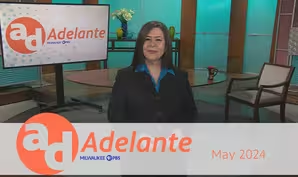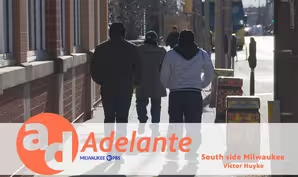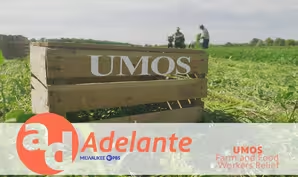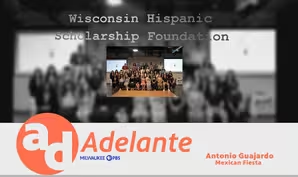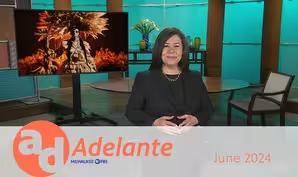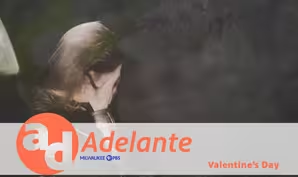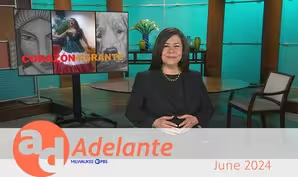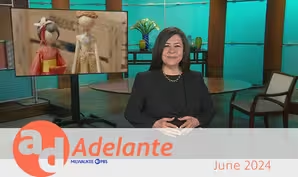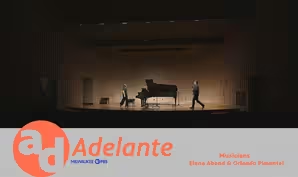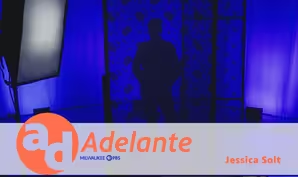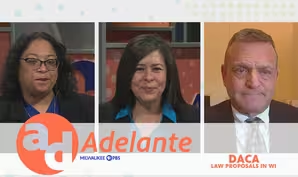Adelante
VOTE 2024 - Table Talk on Education
Clip: Season 25 | 8m 18sVideo has Closed Captions
Milwaukee PBS partnership with Marquette University's Civic Dialogues.
ADELANTE celebrates the rich heritage and issues important both to Latino people and our community at large. This episode highlights the Milwaukee PBS Vote 2024 Table Talk, that Milwaukee PBS held in partnership with Marquette University's Civic Dialogues.
Problems playing video? | Closed Captioning Feedback
Problems playing video? | Closed Captioning Feedback
Adelante is a local public television program presented by MILWAUKEE PBS
This program is made possible in part by the following sponsors: Johnson Controls
Adelante
VOTE 2024 - Table Talk on Education
Clip: Season 25 | 8m 18sVideo has Closed Captions
ADELANTE celebrates the rich heritage and issues important both to Latino people and our community at large. This episode highlights the Milwaukee PBS Vote 2024 Table Talk, that Milwaukee PBS held in partnership with Marquette University's Civic Dialogues.
Problems playing video? | Closed Captioning Feedback
How to Watch Adelante
Adelante is available to stream on pbs.org and the free PBS App, available on iPhone, Apple TV, Android TV, Android smartphones, Amazon Fire TV, Amazon Fire Tablet, Roku, Samsung Smart TV, and Vizio.
Providing Support for PBS.org
Learn Moreabout PBS online sponsorshipPATRICIA GÓMEZ: En asociación con Civil Dialogues de la Universidad Marquette, Milwaukee, PBS y Adelante presentan Vote 2024.
Quédese con nosotros en la segunda de 4 partes de la serie con el tema la educación.
JASLEEN KAUR: I'm Jasleen Kaur, a Political Science Student at Marquette University.
And I'm excited to facilitate today's conversation on education.
CELINA ECHEVESTE: Hi, my name is Celina Echeveste and I am from Milwaukee.
I am here to talk about early childhood education and all the great things that come with it.
GERMÁN DIAZ: Hi, my name is Germán Diaz.
I'm a father and I am a teacher.
And I believe that speaking about education and educational issues are important for our children.
DEANGELA LUNA: My name is DeAngela Luna.
I'm a Native of Milwaukee.
Education has always been really important to me.
And now that I'm raising three young girls, I'm super invested in what the future looks like.
RAE DAKINS: My name is Rae Dakins.
I am a freshman at Marquette University with a criminology and law studies major.
And education is important to me because both of my parents are educators.
ERIK SCHLICK: Hi, I'm Eric Schlick.
I'm from Kenosha, Wisconsin.
I'm here as a Public Educator to talk about education.
JASLEEN KAUR: Civic dialogue is organized around one fundamental question, "What should we do?"
The country faces a teacher shortage.
Public school teachers are also less racially and ethnically diverse than their students.
One in every 50 students enrolled in US higher education is undocumented, yet many undocumented students face barriers that inhibit obtaining a college degree.
Undocumented students, including DACA recipients, are ineligible for federal financial aid, and some states prohibit them from receiving state financial aid or qualifying for in-state tuition.
GERMÁN DIAZ: The question shouldn't be whether undocumented students or Black students or white students or Asian students should be able to go to school.
It should be whether they want to and they have the talent.
We have to look at talent.
We have to look at who has the passion to be a lawyer.
And hopefully, being Brown, being Black, being white, being Asian, being rich, being poor, or being documented or undocumented shouldn't prevent that person from attaining education because we know anything we do in life is going to give back to the community.
It's going to get back to the people, to the new generations.
DEANGELA LUNA: I think if we want our country to, again, be able to move the needle with respect to technology and education, anything, really, on a global level and stay up to speed and stay number one, as we like to project ourselves, we've got to understand the value and diversity of thought.
And those undocumented students who have that passion may have perspective that's needed in the room in order for us to make advancements.
We're born here, but if they are here and they have the passion and they reside here-- GERMÁN DIAZ: Let's invest in them.
DEANGELA LUNA: Yeah, let's invest.
CELINA ECHEVESTE: We have great ideas, but as a country, we continue to put these barriers that-- and we want to be number one in a lot of things, but we continue to put these barriers, where we're limiting our wonderful talent that we have out there.
So we're closing doors instead of opening the doors to us.
GERMÁN DIAZ: 56% of all PhDs in the country are not US citizens, not born here.
We bring them here.
We steal them from other countries.
I could have been in Colombia, but this country gives me a better opportunity.
And so United States has been able to maintain that status quo somewhat and innovation in other fields because the brightest brains are being stolen, are being lured into United States because we can pay them.
RAE DAKINS: So you mentioned how Wisconsin has $7 or $8 billion in reserves.
Why don't they use that money for like a portion to give incentives to universities for undocumented immigrants to help them pay for things?
ERIK SCHLICK: I don't know, but I think part of it is political blockade.
I think your solution of having some type of incentive is probably far off with this current leadership at the state level.
I mean, they tried to get rid of diversity, equity positions at colleges if I'm not mistaken.
So providing incentives for people who are undocumented, I don't see that in this leadership.
RAE DAKINS: Or like we have federal grants.
ERIK SCHLICK: Yeah, I don't know and I'm not familiar with federal grants at the college level.
I mean, at the-- I feel that a lot of-- some families I know that come from the K-12 are escaping really tough living situations like Civil War in South America.
So I think they're here.
I think it's in our best interest to educate them and provide education, but I also think there needs to be a consistent funding for it.
And I think at the state, I don't know-- the reason why we have such a surplus is a lot of it was given to states during the pandemic.
JASLEEN KAUR: Is education an issue that will inform how you vote this November?
RAE DAKINS: Yes.
CELINA ECHEVESTE: Yes, Absolutely.
DEANGELA LUNA: Yes.
ERIK SCHLICK: Oh yes.
[LAUGHTER] Oh, yes.
Oh, yes.
GERMÁN DIAZ: I would say yes, but the issue is bigger than that.
I think there are other issues that I'm really concerned based on the polarization that exists between the two parties.
Education is, of course, I mean, one of the front issues on which I vote but it's not the only one.
ERIK SCHLICK: Who I vote for president, is it the sole issue?
No, but honestly, I'm biased.
I think it's one of the biggest issues.
DEANGELA LUNA: I will share a song lyric by Donny Hathaway, that says, "He ain't heavy.
He's my brother."
So the candidate who most aligns on the most important issues for me in taking care of their fellow man, that's who I'm voting for.
ERIK SCHLICK: Well said, Dee.
JASLEEN KAUR: My hope for the future of American politics is-- ERIK SCHLICK: Honestly, I think the ability to really work together and not this grandeur of getting sidetracked on things that are just a distraction to win more votes.
Just work together and come-- I mean, come to a compromise.
I think we're all missing out on that.
And it's unfortunate, really.
RAE DAKINS: To work for the common good because I feel like there's a lot of things that get in the way of politicians looking at what is the best for the American Community.
GERMÁN DIAZ: I would say that it's the ability to have a dialogue in a conversation like this, where people agree and disagree because that's an opportunity for growth.
I remain hopeful, thinking that's the country-- that's the country where my two kids are going to grow and develop.
And hopefully, my work as a dad and as a teacher will contribute to creating that space.
CELINA ECHEVESTE: We're able to come together, listen, be open to change, because, sometimes change can be a little bit scary for individuals.
But be open to change, be open to try new things.
And like everyone said, work together.
DEANGELA LUNA: Greater transparency and honesty in a candidate's positions and why, because, not everyone understands that it's an ecosystem.
[MUSIC] JASLEEN KAUR: Cheers.
ALL: Cheers.
ERIK SCHLICK: Cheers.
Thank you.
GERMÁN DIAZ: Salud ALL: Salud [MUSIC]
Video has Closed Captions
Clip: S25 | 5m 18s | Vote 2024 Table Talk - Democracy (5m 18s)
Video has Closed Captions
Clip: S25 | 18m 30s | New immigration policies are offering hope to hundreds of thousands (18m 30s)
Video has Closed Captions
Clip: S25 | 7m 43s | Wisconsin EcoLatinos is a nonprofit, fiscally sponsored by the Center for Community Stewardship (7m 43s)
VOTE 2024 - Table Talk on Education
Video has Closed Captions
Clip: S25 | 8m 18s | Milwaukee PBS partnership with Marquette University's Civic Dialogues. (8m 18s)
VOTE 2024 Table Talk and Dr Michael Mendez
Video has Closed Captions
Clip: S25 | 6m 50s | VOTE 2024 Table Talk and Dr Michael Mendez (6m 50s)
Video has Closed Captions
Clip: S25 | 4m 42s | Víctor Huyke, publicist for the newspaper El Conquistador (4m 42s)
UMOS Farm and Food Workers Relief
Video has Closed Captions
Clip: S25 | 10m 10s | United Migrant Opportunity Service, UMOS (10m 10s)
Mexican Fiesta - Antonio Guajardo
Video has Closed Captions
Clip: S25 | 7m 53s | Mexican Fiesta began in 1973 with the purpose of celebrating Mother's Day & Mexico's independence. (7m 53s)
Julieta Zavala is a fashion design artist in folk art
Video has Closed Captions
Clip: S25 | 6m 23s | Julieta Zavala - fashion design artist in folk art (6m 23s)
Video has Closed Captions
Clip: S25 | 11m 30s | Domestic Violence does not discriminate. (11m 30s)
Video has Closed Captions
Clip: S25 | 12m 29s | Yesica Coria is a Mexican folk artist whose works with corn leaves amaze us. (12m 29s)
Video has Closed Captions
Clip: S25 | 16m 12s | Elena Abend and Orlando Pimentel are married Venezuelan artists. (16m 12s)
Video has Closed Captions
Clip: S25 | 17m 25s | Jessica Solt has a hereditary condition that caused her to have surgery to remove her stomach. (17m 25s)
DACA Law Proposals in Wisconsin
Video has Closed Captions
Clip: S25 | 24m 18s | Immigration Reform has not been consolidated in the US is because Democrats/Republicans don't agree. (24m 18s)
Providing Support for PBS.org
Learn Moreabout PBS online sponsorshipSupport for PBS provided by:
Adelante is a local public television program presented by MILWAUKEE PBS
This program is made possible in part by the following sponsors: Johnson Controls
